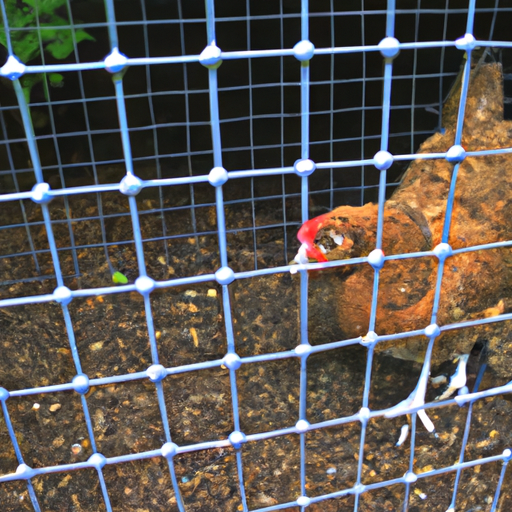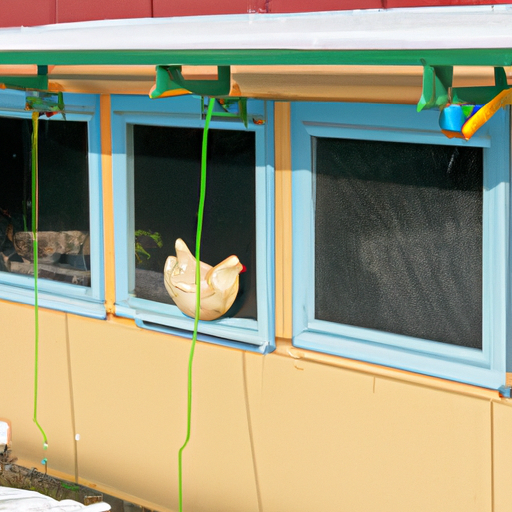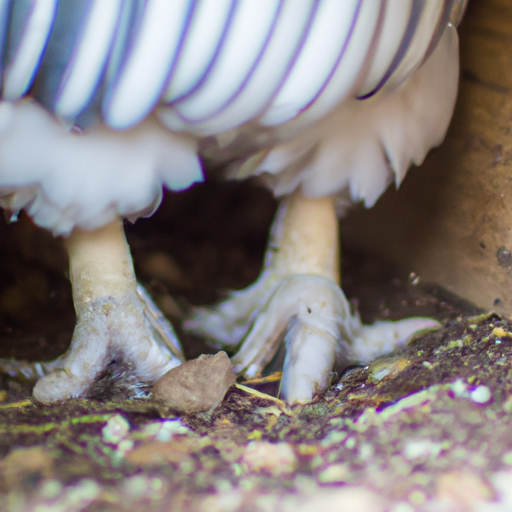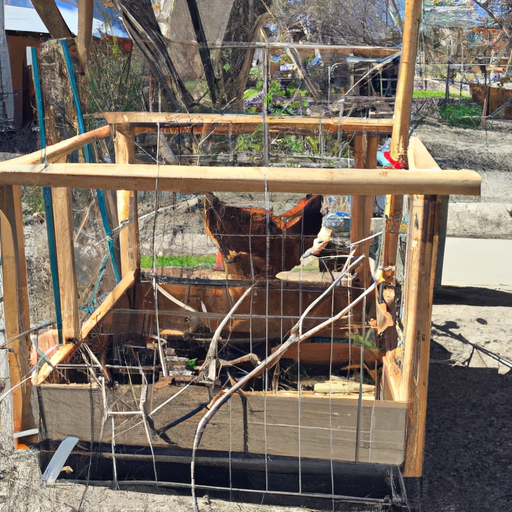Urban chicken keeping has become increasingly popular as more people embrace the idea of sustainable living. However, to ensure a successful and pest-free experience, it is crucial to take the necessary precautions. This article will provide you with essential tips and tricks to avoid attracting unwanted pests while enjoying the benefits of urban chicken keeping. From securing the chicken coop to proper waste management, we’ll guide you every step of the way to ensure that your feathered friends remain happy and healthy without inviting any unwanted guests.
Enclose the chicken coop
When it comes to keeping chickens in an urban setting, one of the most important precautions you should take is to properly enclose the chicken coop. This ensures the safety and security of your chickens while also minimizing the risk of pests infiltrating the coop. Strong wire mesh is essential for the chicken coop as it prevents predators from gaining access to the coop and keeps your chickens safe. Make sure to check for any gaps or holes in the wire mesh regularly and promptly fix them to prevent pests from squeezing through. Additionally, it is important to secure the coop at night to ward off nocturnal predators such as raccoons and foxes. By taking these measures, you can create a safe and pest-free environment for your urban chickens.
Keep the coop clean
Maintaining a clean and hygienic chicken coop is vital not only for the health and well-being of your chickens but also for preventing pests from infesting the area. Regularly remove any waste from the chicken coop, such as droppings and feathers, to prevent the buildup of odor and attract pests. Cleaning the coop thoroughly on a regular basis is another essential step in keeping pests at bay. Use a mild detergent or a disinfectant specifically designed for chicken coops to eliminate any bacteria, mites, or other pests that may be present. Properly disposing of the waste is equally important. Bag the waste securely and dispose of it in the appropriate waste management system to avoid attracting pests.
Store feed properly
Storing chicken feed properly is crucial to avoid attracting pests into your urban chicken keeping setup. Invest in airtight containers for storing the feed to prevent pests such as rats and mice from getting to it. These containers will also help maintain the freshness and quality of the feed. It is equally important to store the feed in a cool, dry place to minimize the risk of pests being attracted to it. Avoid spills and leaks by handling the feed carefully and ensuring that the containers are tightly sealed. By storing the feed properly, you can deter pests from invading your chicken coop and protect your chickens’ food source.
Manage food scraps
While it may be tempting to spoil your chickens with an abundance of food scraps, it is important to exercise caution to prevent attracting pests. Overfeeding the chickens can lead to excess food scraps that can serve as a magnet for pests. Limit the amount of food scraps you provide to your chickens, ensuring they receive a balanced diet. If there are excess food scraps, composting them is an excellent solution. Composting not only reduces waste but also helps deter pests by breaking down the organic matter effectively. By managing food scraps wisely, you can maintain a clean and pest-free environment for your urban chickens.
Secure the chicken run
In addition to enclosing the chicken coop, it is essential to secure the chicken run as well. The chicken run is the outdoor area where your chickens can roam and stretch their legs. Using strong fencing is crucial to prevent predators from entering the run and posing a threat to your chickens. Regularly check the fencing for any gaps or loose areas, and repair them promptly to ensure its effectiveness. Installing predator deterrents in the chicken run is another recommended precaution. These could include motion-activated lights, sprinklers, or even predator scent repellents. By securing the chicken run, you provide your chickens with a safe outdoor space while deterring pests and predators.
Control water sources
Maintaining clean and accessible water sources is essential for the well-being of your chickens and preventing pests from being attracted to your urban chicken setup. Provide your chickens with fresh water daily, ensuring it is clean and free from debris. Avoid leaving standing water, as it can become a breeding ground for pests, such as mosquitoes. Empty and refill water containers regularly to prevent the accumulation of algae or bacteria that can attract pests. By controlling water sources effectively, you can keep your chickens hydrated and reduce the risk of pests infiltrating their environment.
Keep surroundings clean
To maintain a pest-free environment for your urban chicken keeping, it is important to keep the surroundings clean and free from potential attractants. One way to achieve this is by regularly removing fallen fruits and vegetables from the area. These can rot and attract pests such as rats and flies. Additionally, trimming overgrown vegetation around the chicken coop and run can reduce hiding places for pests, providing less opportunity for them to infiltrate the area. Dispose of garbage properly, ensuring it is securely sealed and removed from the vicinity to deter pests from being attracted to your urban chicken keeping space.
Monitor for pests
Regularly monitoring for signs of pests is an essential practice in urban chicken keeping. Keep an eye out for any indications of infestation, such as droppings, chewed wires, or unusual behavior in your chickens. If you notice any signs, it is crucial to act promptly. Use traps and deterrents specifically designed for the pests you are targeting. These can include traps for rodents or insect repellents for flies and mosquitoes. If the infestation becomes severe or persists despite your efforts, it may be necessary to consult with pest control professionals who specialize in dealing with urban chicken keeping setups. By monitoring for pests and taking appropriate action, you can ensure a pest-free and safe environment for your urban chickens.
Maintain good hygiene practices
Personal hygiene plays a significant role in preventing the spread of pests and potential diseases in urban chicken keeping. After handling chickens, always wash your hands thoroughly with soap and water. This simple practice helps minimize the risk of transferring any potential pathogens to yourself or other areas within your urban chicken setup. Wearing protective clothing, such as gloves and boots, can also provide an extra layer of protection against potential contact with pests or their waste. Avoid bringing any outside items, such as tools or equipment, into the chicken coop unless they have been adequately cleaned and sanitized. By maintaining good hygiene practices, you prioritize the health and safety of both you and your urban chickens.
Educate neighbors and community
Raising awareness and educating your neighbors and community about responsible urban chicken keeping practices is a proactive step in preventing the attraction of pests. Inform your neighbors about your chickens and provide them with valuable information on how they can contribute to the overall success and safety of your setup. Encourage responsible waste disposal practices, such as securely bagging garbage and composting food scraps, to avoid attracting pests within the neighborhood. Share pest prevention tips with your community, promoting a collective effort to keep urban chicken keeping areas pest-free. By educating and involving your neighbors and community, you create a more harmonious and pest-conscious urban environment for everyone.
In conclusion, taking precautions to avoid attracting pests in urban chicken keeping is crucial for ensuring the health, safety, and well-being of your chickens. By following the outlined steps, including properly enclosing the coop, maintaining cleanliness, storing feed correctly, managing food scraps, securing the chicken run, controlling water sources, keeping the surroundings clean, monitoring for pests, maintaining good hygiene practices, and educating your neighbors and community, you can create a pest-free environment for your urban chickens and enjoy the benefits of raising chickens in an urban setting. Remember, a little effort and awareness go a long way in maintaining a harmonious and pest-free coexistence between urban chickens and their human neighbors.




